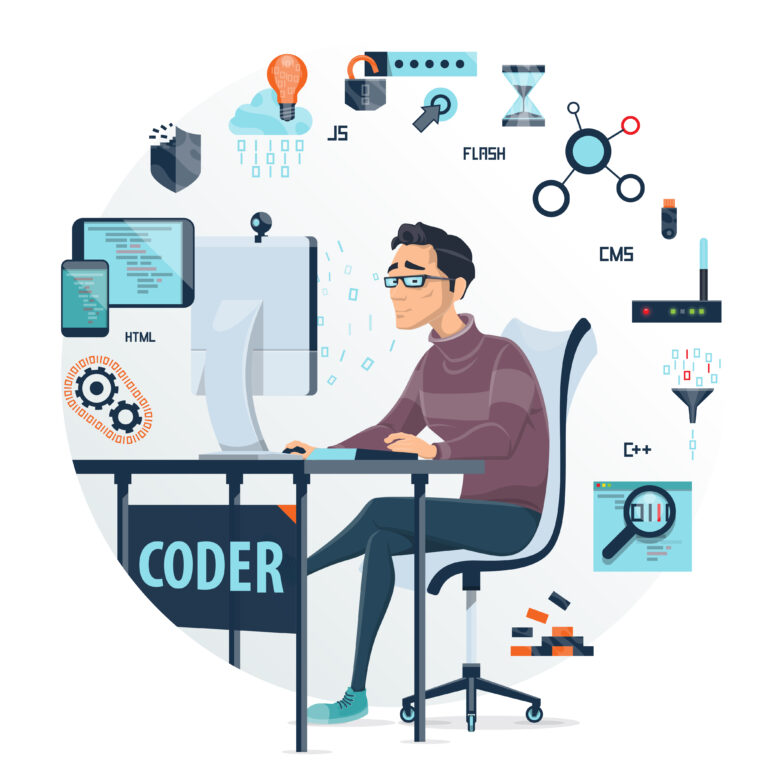Python Programming as a Career: A Smart Move for the Future
When I began my journey into the world of technology, I had no clue which path to take. The tech landscape was vast, confusing, and ever-changing. But one term kept popping up in conversations, online forums, and job postings—Python programming. It wasn’t long before I realised that learning Python could be a game-changer for my career. Today, I’m here to share why I believe Python programming as a career is one of the smartest career moves you can make and how you can get started.
What is Python Programming?
When I first heard the term Python programming, I’ll admit—I thought it sounded complicated. But once I dipped my toes into it, I realized it was anything but intimidating. Python programming is essentially the process of writing instructions in the Python language to make computers perform specific tasks. But let me break that down in a way that’s more relatable.
Imagine trying to explain to someone how to make a cup of tea. You’d say, “Boil water, add tea leaves, let it steep, and then pour it into a cup.” That’s precisely what programming is—giving instructions. The only difference is, you’re giving those instructions to a computer. Python just happens to be one of the easiest and most flexible languages to do that with.
Python is a high-level, general-purpose programming language. “High-level” means it’s close to human language, so it’s easier to read and write. “General-purpose” means it’s not limited to one type of task—you can use it for anything from building websites to training AI models.
Python is also interpreted, meaning you don’t have to compile your code before running it. This saves time and makes testing and debugging faster, especially for beginners like I once was.
One of the most important aspects of Python is its clear and readable syntax. Unlike other programming languages where you may get lost in semicolons, curly braces, and long lines of code, Python keeps things simple.
It allows you to write logical code for small and large-scale projects alike. Python supports multiple programming paradigms, including procedural, object-oriented, and functional programming, making it versatile enough to adapt to various development needs.
In my journey, I discovered that python programming isn’t just about writing code—it’s about solving problems, automating tasks, analyzing data, building web apps, and even creating art or music using code. Python acts as a bridge between creativity and logic, making it a favourite not just in tech companies but also in fields like finance, healthcare, education, and entertainment.
Who Developed Python?
Before diving into the career benefits, let’s take a quick look at the origins of this incredible language. Python was developed by Guido van Rossum and was first released in 1991. His goal was to create a language that was both powerful and easy to understand. Inspired by the British comedy group Monty Python (hence the name), van Rossum emphasized readability and simplicity, making Python one of the most beginner-friendly programming languages.
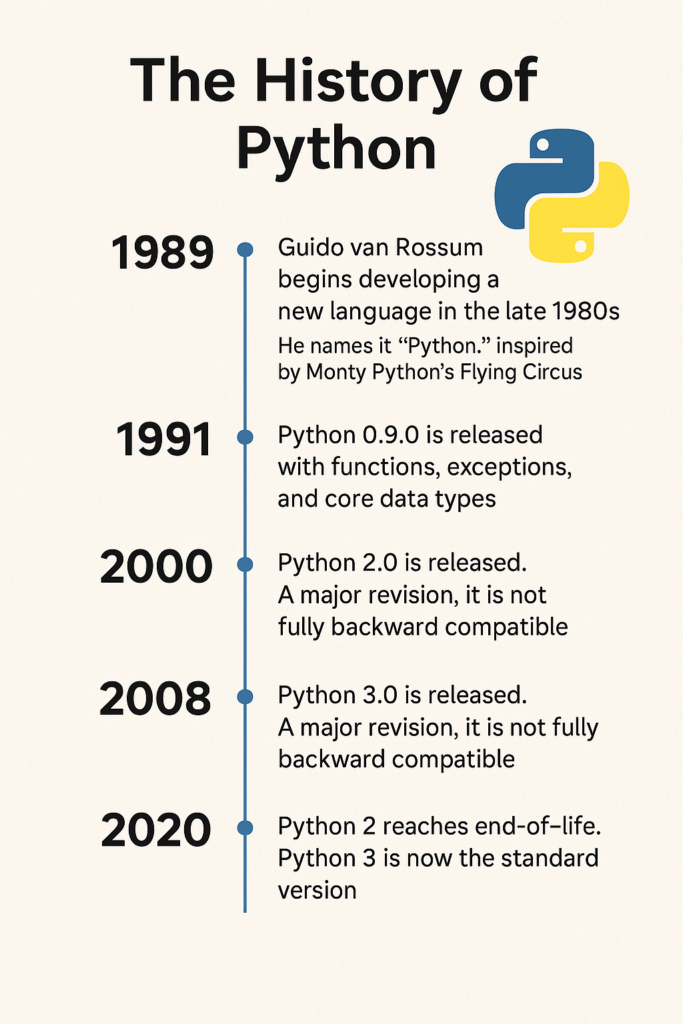
What Are the Key Features of Python?
So, what makes Python stand out from the rest? Here are a few key features of Python that I personally find extremely useful:
1.Easy to Learn and Read:
Python syntax is clean and easy to understand human language to an extent, making it easier for beginners. Even if you’re not a programmer, you can often guess what a piece of Python code is doing just by reading it.
2.Open Source:
Python is not just a language, but as a global community-driven project. In simple terms, it is an open-source programming language, which means the source code is freely available to the public. Anyone—yes, literally anyone—can view, use, modify, and distribute the code without paying any license fees.
3.Extensive Libraries and Frameworks:
When I first began my journey with Python, I was amazed at how quickly I could build something useful without starting from scratch. That’s because Python doesn’t just give you the language—it gives you an entire toolbox filled with ready-made solutions. These tools come in the form of libraries and frameworks, and trust me, they make life so much easier. Whether it’s web development (Django, Flask), data science (Pandas, NumPy), or AI/ML (TensorFlow, Scikit-learn), No matter your interest, there’s a Python library ready to back you up.
4.Cross-Platform Compatibility:
Write your code once, and run it on any platform. Imagine writing your code on a Windows machine and running it smoothly on a Linux server or macOS laptop—without rewriting a single line. That’s the magic of Python.
5.Strong Community Support:
Let me tell you—when you get stuck (and you will!), the last thing you want is to feel alone. With Python’s community, you rarely do. When I began learning Python, I quickly realised that I wasn’t just learning a programming language. I was stepping into a global ecosystem of developers, teachers, learners, and enthusiasts who are constantly building, sharing, and supporting each other.
Who Can Learn Python Programming?
The best part about Python is that anyone can learn it. Whether you’re a student, a working professional, or someone looking to switch careers, Python is incredibly accessible. You don’t need a tech background. If you know how to use a computer and are willing to learn, Python welcomes you.
When I first started, I barely understood how code worked. But with consistent practice and the right resources, I was able to build real-world applications in a matter of months. Python programming for beginners has never been easier or more rewarding.
Why is Python So Popular?
Python’s popularity has skyrocketed over the years, and for good reason. Here’s why Python is so popular:
1.Versatility:
What I love most about Python is how versatile it is. I can use it to build websites, automate repetitive tasks, analyze massive datasets, or even create games—all with the same language and tools.
2.Industry Adoption:
It gave me a lot of confidence to know that companies like Google, Netflix, and Instagram use Python every day. Seeing how widely it’s adopted across different industries reassured me that I was learning a language with serious career potential.
3.Data Science and AI Boom:
As someone interested in data science and AI, Python quickly became my go-to language. Its clean syntax and powerful libraries made it easier for me to dive into machine learning, data analysis, and AI model development.
4.Great for Prototyping:
Whenever I have a new idea, Python helps me bring it to life faster than any other language I’ve tried. I can build a working model quickly without spending hours writing boilerplate code, which is a huge advantage during early-stage development.
In short, Python is popular because it empowers developers to be productive and creative, regardless of their domain.
What is Python Used For?
The uses of Python are as diverse as the people who learn it. I’ve personally explored a few of these areas, and I’m constantly amazed by how flexible and powerful Python really is. Let me break down where Python truly shines:
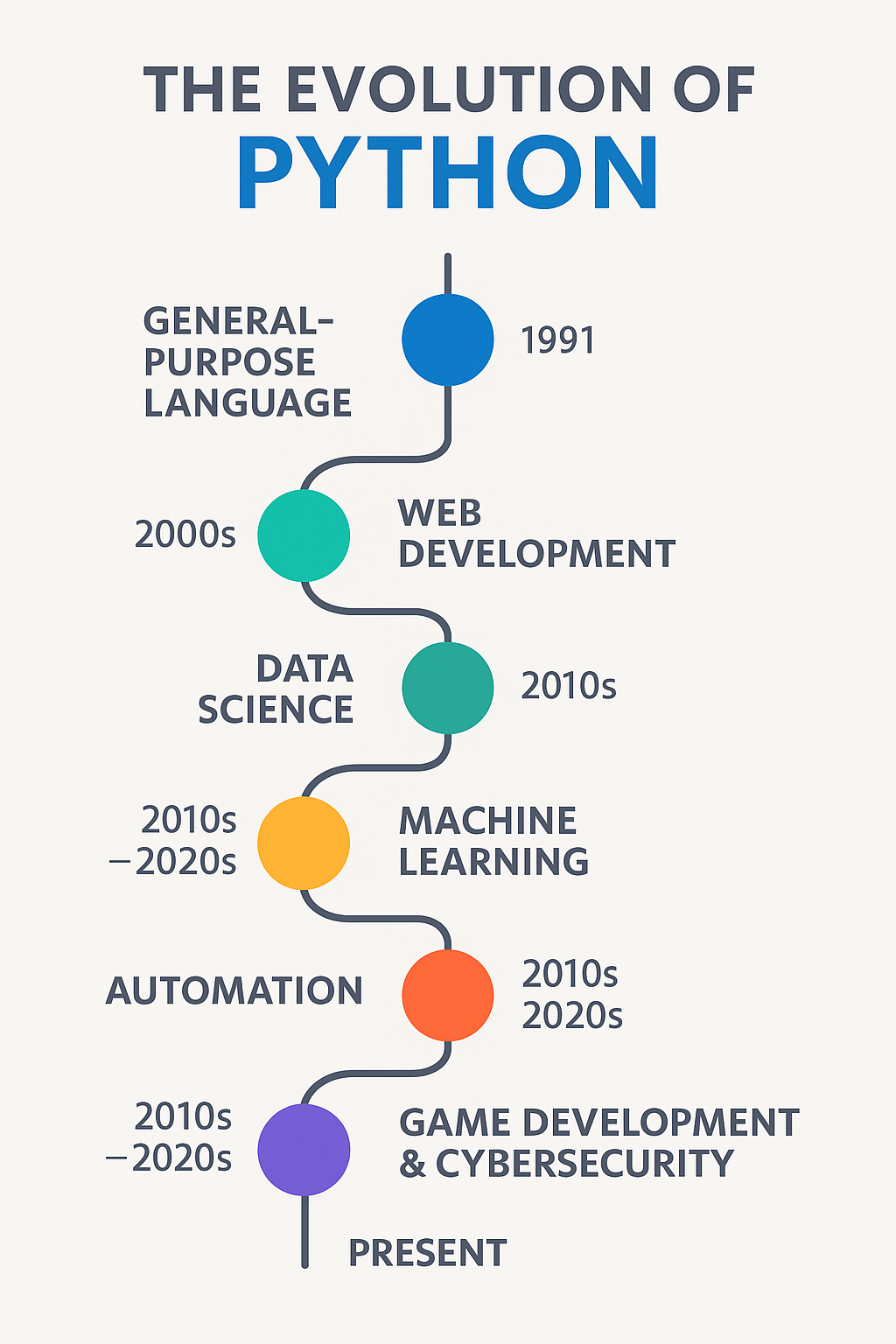
Web Development
When I started building websites, Python made the process much simpler thanks to frameworks like Django and Flask. These tools handle everything from routing and databases to security, allowing me to focus more on the design and functionality of the site.
Data Analysis and Visualization
Python helped me make sense of large, messy data sets using libraries like Pandas and NumPy. For visualizing trends and insights, I found tools like Matplotlib and Seaborn incredibly helpful—especially when I needed to present my findings in a clear, visual way.
Machine Learning and AI
As I ventured into machine learning and AI, Python quickly became my go-to language. Libraries like TensorFlow, Keras, and PyTorch gave me access to powerful algorithms and tools that made building intelligent systems more approachable, even for someone without a PhD in AI.
Automation and Scripting
One of the most satisfying things I learned to do with Python was automate everyday tasks—like renaming hundreds of files, scraping data from websites, or even sending scheduled emails. It saves time and reduces the chances of human error, making my workflow much smoother.
Game Development
Though I’m not a full-time game developer, experimenting with Pygame was a lot of fun. It gave me a solid introduction to building interactive graphics, handling player input, and creating the logic behind simple 2D games.
Cybersecurity and Networking
Python is also a favorite in the cybersecurity and networking world. I’ve used it to write scripts for automating network configurations and even explored basic penetration testing techniques using Python-based tools.
When Should We Use Python Over Other Languages?
I often get asked: “Is Python better than Java or C++?” Well, it depends on what you’re trying to do. Here are scenarios when we should use Python over other languages:
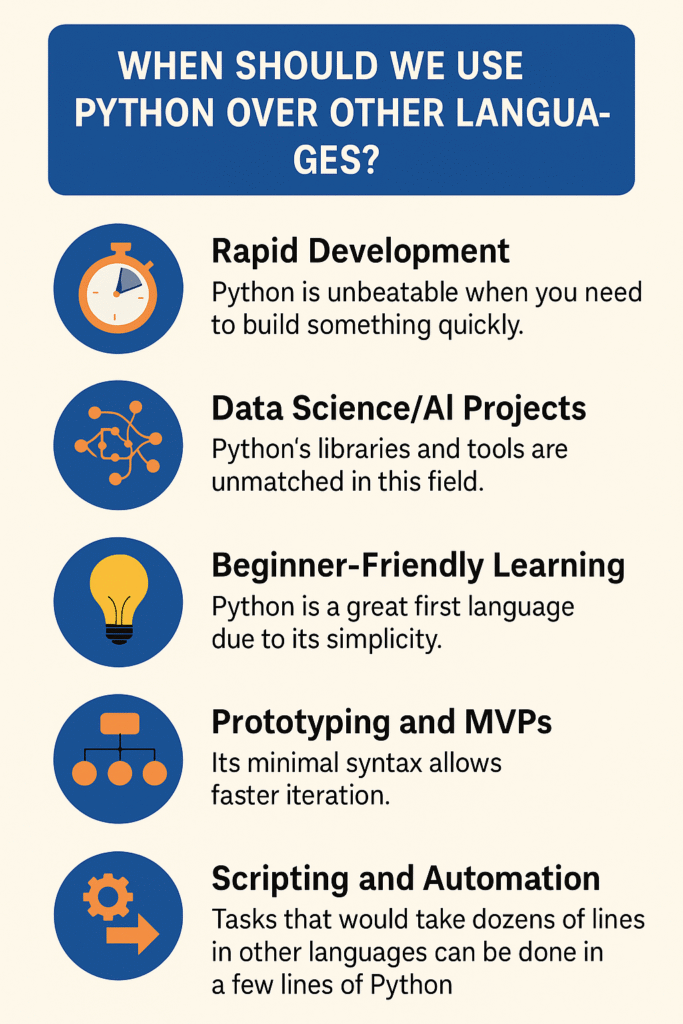
Rapid Development
When time is tight and I need to build something fast, Python is always my first choice. Its clean syntax and rich ecosystem of libraries help me go from idea to working application much quicker than traditional languages like Java or C++.
Data Science/AI Projects
In the world of data, nothing beats Python. Whether I’m building machine learning models, cleaning large datasets, or visualizing data trends, the tools available in Python—like Pandas, TensorFlow, and Scikit-learn—make complex tasks surprisingly manageable.
Beginner-Friendly Learning
If someone is learning to code for the first time, I always recommend starting with Python. Its syntax is so close to plain English that it makes programming feel intuitive and far less intimidating compared to languages like C++ or Java.
Prototyping and MVPs
When I need to test a new idea or create a Minimum Viable Product (MVP), Python lets me build and iterate quickly. There’s less setup involved, so I can focus more on features and user feedback instead of worrying about compiling and managing heavy code structures.
Scripting and Automation
I’ve used Python to automate countless repetitive tasks—like sorting files, scraping websites, and managing data backups. What would take dozens of lines in other languages often takes just a few lines in Python, which makes life a whole lot easier.
However, for applications requiring high performance (like game engines or real-time systems), C++ might be a better choice. But for most modern applications, Python is more than enough.
Skills to Learn to Become a Python Developer
If you’re serious about becoming a Python developer, here are some key skills you should focus on:
- Core Python: Learn syntax, data types, loops, functions, and error handling.
- Object-Oriented Programming (OOP): Understand classes, inheritance, and polymorphism.
- Web Frameworks: Get comfortable with Django or Flask.
- Databases: Learn how to work with SQL and ORM tools.
- Version Control: Git is a must-have skill in any developer’s toolkit.
- APIs and RESTful Services: Learn to consume and create APIs.
- Data Structures and Algorithms: Strengthen problem-solving skills.
- Testing and Debugging: Learn unit testing with PyTest or Unittest.
- Deployment: Get familiar with platforms like Heroku, AWS, or Docker.
Optional but highly recommended: explore data science, machine learning, and automation, depending on your interests.
Career Opportunities and Salary
Python developers are in high demand, and this trend shows no signs of slowing down. Roles you can target include:
Python Developer
Web Developer
Data Analyst
Data Scientist
Machine Learning Engineer
DevOps Engineer
Automation Tester
AI/ML Researcher
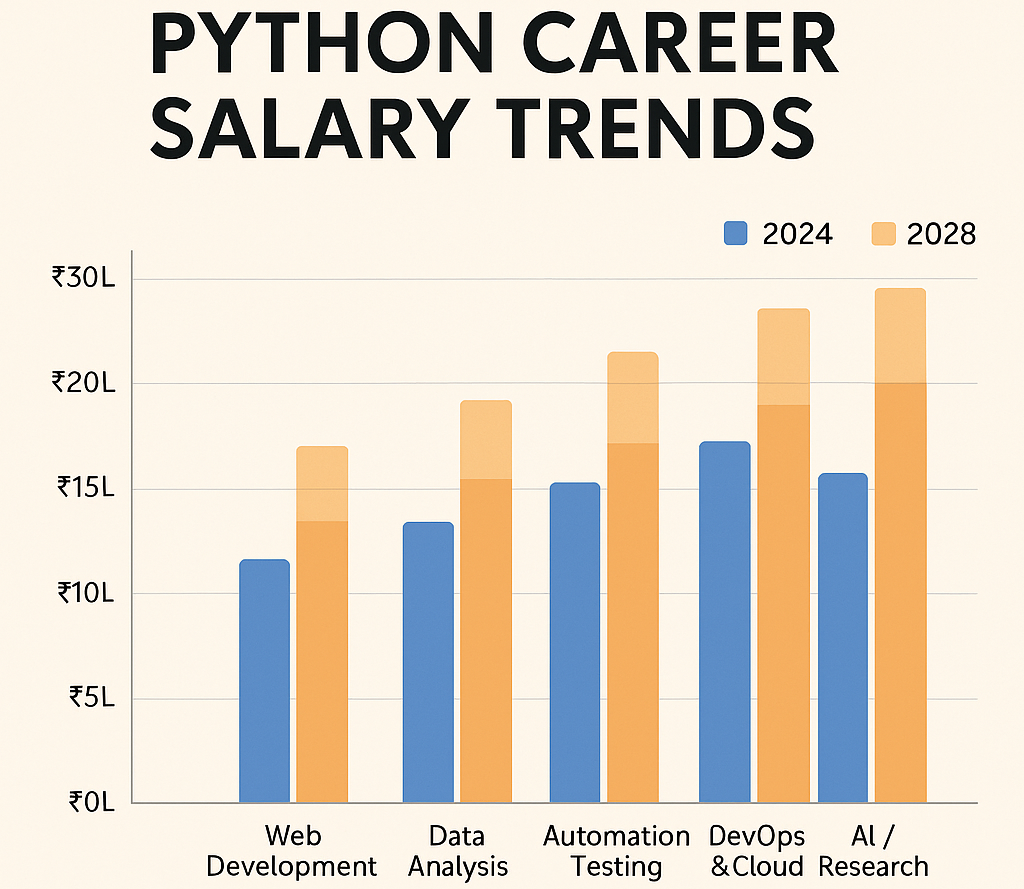
Sources for Python Career Salary Infographic
Glassdoor, Payscale, Linkdin, Indeed, Naukri, Survey, analyticsindiamag, Developsinstitute, Aiindex, Nature
In India, a fresher Python developer can earn between ₹4-6 LPA, and with experience, the number can easily go beyond ₹15-20 LPA, especially in data science and AI roles. Globally, Python developers are among the top earners in the tech industry.
Key Sectors Offering Vast Career Opportunities in Python
The scope for Python extends across various domains. Here are some key sectors offering vast career opportunities:
IT and Software Services
Healthcare and Bioinformatics
Finance and FinTech
Retail and E-commerce
Media and Entertainment
Automotive and Manufacturing
Education Technology (EdTech)
Government and Public Sector
Whether it’s building data pipelines in a hospital, analyzing user behavior for a shopping app, or automating government services, Python is being used everywhere.
Can AI Replace Python Developers?
This is a hot topic—can AI replace Python developers? The honest answer: not entirely.
AI tools like ChatGPT can assist in generating code, debugging, or even offering architectural suggestions. But programming isn’t just about writing code. It’s about understanding problems, thinking logically, and building innovative solutions—something AI is still far from mastering independently.
Moreover, someone has to write the code for AI, maintain it, and train it. So, instead of seeing AI as a threat, see it as a powerful assistant that can help you become a better and more efficient developer.
Why Join Python Course with SkillUp Academy?
There are hundreds of courses out there, but choosing the right one can make all the difference. I highly recommend joining a Python course with SkillUp because:
- Structured Curriculum: You learn step-by-step, which is crucial for beginners.
- Hands-On Projects: You build real applications, not just theory.
- Expert Guidance: You get support from industry professionals.
- Certification: Adds value to your resume.
- Community Support: Learn with a group, share ideas, get feedback.
When I joined a structured course, it gave me the discipline and confidence I needed to move forward faster.
Final Thoughts
If you’re considering a new career path or simply want to future-proof your skills, Python programming as a career is a wise choice. It’s beginner-friendly, widely used, and opens the door to a range of high-paying, exciting roles across various industries.
So why wait? Start small, stay consistent, and soon you’ll be building your own applications, solving real-world problems, or maybe even contributing to the next big thing in tech.
I hope this post helps you understand the incredible scope of Python programming and inspires you to take that first step. Trust me, your future self will thank you.

